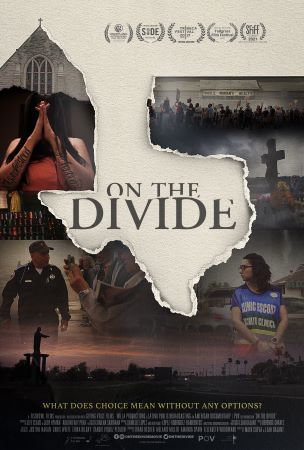
On the Divide 2021
Distributed by Good Docs
Produced by Diane Becker, Melanie Miller, Amanda Spain, and Elizabeth Woodward
Directed by Maya Cueva and Leah Galant
Streaming, 79 mins
College - General Adult
Christianity; Protest Movements; Reproductive Rights
Date Entered: 04/22/2022
Reviewed by Rachael Dreyer, Head of Research Services for Special Collections, Pennsylvania State UniversityThis documentary weaves together the stories of three different people who have had their lives irrevocably altered by the deep polarization surrounding access to abortion. The documentary follows the subjects for several years, from 2016-2018, allowing viewers to follow the consequences of various choices each individual pursues. The film illustrates how people’s perspectives and viewpoints can shift, particularly if they encounter particular people at crucial times of transition in their lives.
We meet first Mercedes, a mother who by her own admission is “very involved in the pro-life scene.” She calls herself a prayer warrior, praying her rosary outside of Whole Woman’s Health Clinic. However, over the course of the documentary, which spans several years, Mercedes’ marriage falls apart after her husband is jailed for driving while intoxicated; she begins working to support her children. Eventually, her addiction reclaims her, and she loses custody of her children. Throughout these calamities, the pro-life advocate, Yolanda, who embraced and welcomed her while Mercedes followed the pro-life path, offers no support - no addiction recovery support, no offers of childcare or rental assistance. She sees Yolanda again, at the pregnancy resource center for a pregnancy test. Mercedes later visits an actual medical clinic: this time, she picks up birth control pills in an effort to maintain autonomy from a controlling boyfriend.
Denisse, a volunteer clinic escort, also a mother of several children, shares her story and the desperation with which she faced her third and fourth pregnancy because of the poverty and unemployment she and her spouse experienced. The friendship and solidarity she has with her friends--fellow clinic escorts and reproductive rights advocates--grounds her and allows her an outlet for her righteous anger over the hypocrisy of politicians who claim to be pro-life but seem to forget that life continues after conception and requires social safety networks like food stamps and housing vouchers. We watch as Denisse becomes politically active, informed by her involvement as a volunteer clinic escort.
Rey is the clinic security guard who ensures that pro-life protesters abide by private property rules and don’t overstep legal bounds as they harass clinic visitors. He works for a private security company that has assigned him to clinic detail. A practicing Catholic who also believes that women should have the right to access care they need, he has been cold-shouldered out of his community church. The schism between his faith and the job he performs has clearly taken a toll and we see how he struggles to reconcile multiple belief systems. It takes a physical toll, too: he is physically assaulted at a local grocery store. Religion for Rey continues, but it is now a private thing for him; he prays alone, outside of the church. His church has ostracized and failed him, but Rey seems content as the warm and lively crew of clinic volunteers welcome him affectionately into their circle, celebrating his birthday and taking him to the polls to vote.
Artfully done, this documentary shows the complexity of the pro-life/pro-choice debate within the community of McAllen, TX--for those involved, it is always deeply personal and informed by lived experiences. The documentary’s directors expose the empty posturing and false piety of pro-life of those who claim Christian precepts as justification for their actions, professing the sanctity of life but doing little to protect and nurture the lives of babies after they’re born through social support programs. In the final minutes of the film, Denisse takes us to a cemetery and to the grave of one woman who obtained a fatal illegal abortion, showing viewers that abortion bans do real harm to women’s reproductive health at best, and claim lives at worst.
Awards: Santa Fe Independent Film Festival, Best Documentary Feature; New Orleans Film Festival, Best Documentary Feature
Published and licensed under the Creative Commons Attribution 4.0 license. Anyone can use these reviews, so long as they comply with the terms of the license.